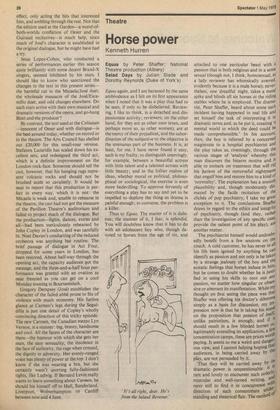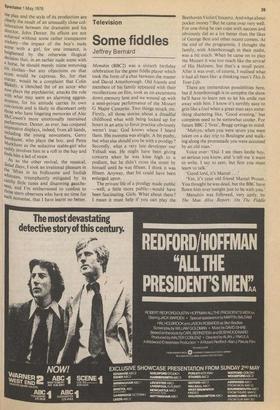Theatre
Horse power
Kenneth Hurren
Equus by Peter Shaffer; National Theatre production (Albery) Salad Days by Julian Slade and Dorothy Reynolds (Duke of York's) Equus again, and I am harassed by the same ambivalence as [felt on its first appearance when I noted that it was a play that had to be seen, if only to be disbelieved. Reviewing, I like to think, is a detached and. dispassionate activity; reviewers, on the other hand, for they are as other men (even, and perhaps more so, as other women), are at the mercy of their prejudices, and the subordination of the subjective to the objective is the strenuous part of the business. It is, at least, for me. I have never found it easy, such is my frailty, to distinguish unerringly, for example, between a beautiful actress with little talent and a talented actress with little beauty; and in the loftier realms of ideas, whether moral or political, philosophical or sociological, the exercise is even more bedevilling. To approve fervently of everything a play has to say and yet to be impelled to deplore the thing as drama is painful enough; in converse, the problem is a killer.
Thus to Equus. The matter of it is dubious; the manner of it, I fear, is splendid. You will doubtless know that it has to do with an adolescent boy who, though devoted to horses from the age of six, and
attached to one particular beast with a passion that is both religious and in a sense sexual (though not, I think, homosexual, as a lady reviewer has whimsically averred, evidently because it is a male horse), nevertheless, one dreadful night, takes a metal spike and blinds all six horses at the riding stables where he is employed. The dramatist, Peter Shaffer, heard about some such incident having happened in real life and set himself the task of interpreting it in dramatic terms and, as he put it, creating 'a mental world in which the deed could be made comprehensible.' In his account, then, the boy is referred by a concerned magistrate to a hospital psychiatrist and the play takes us, rivettingly, through the various stages of 'analysis' whereby this man discovers the bizarre motive and is able to embark on treatment that will rid his ilatient of the remorseful nightmares that engulf him and restore him to a kind of 'normality'. The explanation has a smooth plausibility and, though moderately dismayed by the facile recitation of the clichés of pop psychiatry, I take no great exception to it. The conclusions Shaffer draws in regard to the ethics and integrilY of psychiatry, though (and they, rather than the investigation of any specific case, provide the salient point of his play), are another matter.
The psychiatrist himself would undoubtedly benefit from a few sessions on the couch. A cold customer, he has never in all his life been ignited by anything he call identify as passion and not only is he takerl by a strange jealousy of the boy and the ecstatic feelings that horses induce in hint, but he comes to doubt whether he is josti" fled in using his skills to root out tie passion, no matter how singular or obsessive or aberrant its manifestation. While olY thought on first seeing the piece was that Shaffer was offering his doctor's dilemma simply as a basis for discussion, my
pression now is that he is taking his stew on the proposition that passion of itself:
unlike patriotism, is enough; and if It should result in a few blinded horses or, legitimately extending its application, a fesw, concentration camps, these are prices wortn paying. It seems to me a weird and danger; ous view, and I cannot helping hoping tha audiences, in being carried away by the play, are not persuaded by it.
That they will be carried away by dramatic power is unquestionable: it I'
rare and lovely to encounter such orderlYci
muscular and well-turned writing, rarer still to find it in concurrence vitt' direction of such consummate unelefstanding and theatrical flair. The method of the play and the style of its production are clearly the result of an unusually close collaboration between the dramatist and his director, John Dexter. Its effects are not achieved without some rather transparent trickery—the impact of the boy's nude scene with a girl, for one instance, is heightened by the otherwise illogical decision that, in an earlier nude scene with a.horse, he should merely mime removing his clothes—but any objections on that score would be captious. So, for that matter, would be a complaint that Colin Blakely, a clenched fist of an actor who n?vg plays the psychiatrist, attacks the role With what may seem an alarming aggressiveness, for his attitude carries its own conviction and is likely to disconcert only those who have lingering memories of Alec McCowen's more emotionally restrained Performance. Dexter, as ever, has conjured impressive displays, indeed, from all hands, including the young newcomers, Gerry Sundquist, who plays the boy, and Petra Markham as the seductive stable-girl who rashly involves him in a roll in the hay and finds him a lad of straw. As to the other revival, the musical, Salad Days, I took an irrational pleasure in the 'fifties in its frolicsome and foolish Whimsies, triumphantly mitigated by its catehY little tunes and disarming gaucheness, and I'm embarrassed to confess to those stern observers who have no time for such nonsense, that I have learnt no better.



































 Previous page
Previous page